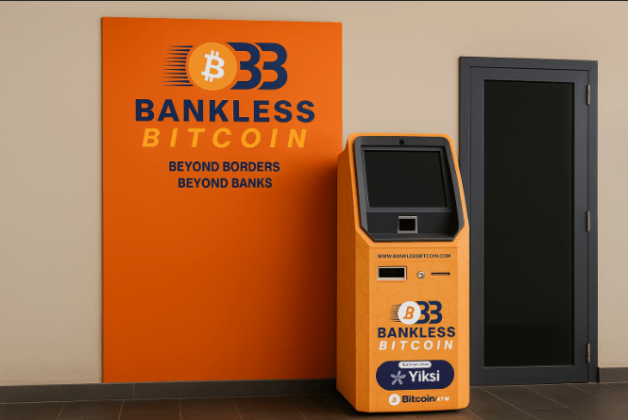Bitcoin ATMs branded “Bankless Bitcoin” have been spotted inside busy shopping centers in Nairobi, including Two Rivers Mall and outlets along Ngong Road in Westlands.
According to local reports, the orange machines now sit beside conventional bank ATMs, offering quick cash-to-Bitcoin and sell options to mall visitors.
The presence of the kiosks has drawn attention because they arrived as Kenya’s new Virtual Assets Service Providers Act came into force on November 4, 2025.
Regulators Say No VASPs Licensed
A joint notice from the Central Bank of Kenya (CBK) and the Capital Markets Authority (CMA) has stressed that neither agency has yet licensed any VASPs under the new law.
Based on reports, the National Treasury is still writing the detailed rules that will start the formal licensing process.
Until those regulations are released, the regulators warned that any firm claiming it is licensed is operating outside the law.
Buy Bitcoin in Kenya at Two Rivers Mall ground floor next to Levi’s store, minimum purchase amount is ksh 1 the machine has been installed by @BanklessBitcoin and only accepts on chain deposit and withdrawals from any wallet.https://t.co/dWBXPz8V7H pic.twitter.com/HFlG1lUEpb
— Bitcoin Nairobi (@btcnairobi) November 16, 2025
Grassroots Use Preceded Mall Machines
Outside the shopping centers, crypto use has already been tested in low-income areas. Reports have disclosed that a fintech group, AfriBit Africa, began trial payments in Bitcoin in Soweto West, a part of Kibera, in 2022.
The project paid small grants after weekend clean-ups, and AfriBit says about $10,000 has been distributed so far. About 200 people in that community now use Bitcoin for savings or payments, and some local merchants and the so-called “boda boda” (border to border) motorcycle riders accept it.
For people who often lack ID or bank accounts, holding value in Bitcoin has been described as a form of financial freedom by project leaders, especially for those living on about one dollar a day.
ATMs Bring Quick Access And Big Questions
The kiosks make buying and selling crypto as simple as using a cash machine. That convenience also brings immediate concerns about their operators, the kind of identity checks they use, and how customer funds are handled after each transaction.
Those details are not clear from the public images and early reports. Price swings in Bitcoin mean someone can buy and then lose value quickly.
At the same time, regulators have said the law includes rules aimed at stopping money laundering and terrorist financing, and it names CBK and CMA as the joint supervisors responsible for oversight.
Regulatory Steps And Consumer Protections
The VASP Act sets out obligations for service providers once licensing begins, including measures to prevent illicit finance.
Based on reports, the law seeks to balance consumer protection with room for new services to operate under supervision.
The Treasury’s upcoming regulations will determine how strict KYC requirements will be, what transaction limits might apply, and how oversight will be shared between the two agencies.
Featured image from Capital News, chart from TradingView

Trusted Editorial content, reviewed by leading industry experts and seasoned editors. Ad Disclosure
Bitcoin ATMs branded “Bankless Bitcoin” have been spotted inside busy shopping centers in Nairobi, including Two Rivers Mall and outlets along Ngong Road in Westlands.
Related Reading: US Holding Off On Bitcoin Reserve—Waiting For The World To Move First, Crypto Expert Says
According to local reports, the orange machines now sit beside conventional bank ATMs, offering quick cash-to-Bitcoin and sell options to mall visitors.
The presence of the kiosks has drawn attention because they arrived as Kenya’s new Virtual Assets Service Providers Act came into force on November 4, 2025.
Regulators Say No VASPs Licensed
A joint notice from the Central Bank of Kenya (CBK) and the Capital Markets Authority (CMA) has stressed that neither agency has yet licensed any VASPs under the new law.
Based on reports, the National Treasury is still writing the detailed rules that will start the formal licensing process.
Until those regulations are released, the regulators warned that any firm claiming it is licensed is operating outside the law.
Grassroots Use Preceded Mall Machines
Outside the shopping centers, crypto use has already been tested in low-income areas. Reports have disclosed that a fintech group, AfriBit Africa, began trial payments in Bitcoin in Soweto West, a part of Kibera, in 2022.
The project paid small grants after weekend clean-ups, and AfriBit says about $10,000 has been distributed so far. About 200 people in that community now use Bitcoin for savings or payments, and some local merchants and the so-called “boda boda” (border to border) motorcycle riders accept it.
For people who often lack ID or bank accounts, holding value in Bitcoin has been described as a form of financial freedom by project leaders, especially for those living on about one dollar a day.
ATMs Bring Quick Access And Big Questions
The kiosks make buying and selling crypto as simple as using a cash machine. That convenience also brings immediate concerns about their operators, the kind of identity checks they use, and how customer funds are handled after each transaction.
Those details are not clear from the public images and early reports. Price swings in Bitcoin mean someone can buy and then lose value quickly.
At the same time, regulators have said the law includes rules aimed at stopping money laundering and terrorist financing, and it names CBK and CMA as the joint supervisors responsible for oversight.
Related Reading: Bitfury Says Goodbye To Mining, Hello To A $1 Billion Tech Fund
Regulatory Steps And Consumer Protections
The VASP Act sets out obligations for service providers once licensing begins, including measures to prevent illicit finance.
Based on reports, the law seeks to balance consumer protection with room for new services to operate under supervision.
The Treasury’s upcoming regulations will determine how strict KYC requirements will be, what transaction limits might apply, and how oversight will be shared between the two agencies.
Featured image from Capital News, chart from TradingView

Editorial Process for bitcoinist is centered on delivering thoroughly researched, accurate, and unbiased content. We uphold strict sourcing standards, and each page undergoes diligent review by our team of top technology experts and seasoned editors. This process ensures the integrity, relevance, and value of our content for our readers.



 Bitcoin
Bitcoin  Ethereum
Ethereum  XRP
XRP  Wrapped SOL
Wrapped SOL  Dogecoin
Dogecoin